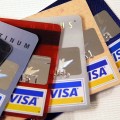There is almost nothing more troublesome than having too much debt to pay each month. Consumers incur debt for many different reasons. Sometimes illness, accidents, or just bad luck can make it seem impossible to get finances under control. Other times it is simply because we spend more money than we earn. The first step toward taking control of your financial situation is to learn how to eliminate your credit card debt.
Develop a budget. Start by listing all sources of income. First list fixed expenses such as mortgage payments, insurance premiums, and auto loans. Next, list the expenses that vary from month to month such as utility bills, recreation and clothing. If there is any hope of controlling your credit card debt you must create and stick to a budget.
There are different kinds of debts. Mortgages and auto loans are debts secured by collateral. In the event of default on a secured debt, a lender may foreclose on your home or repossess your car. Unsecured debts are loans with no collateral and often have variable interest rates and are assessed a fee for late payments. In the event of default on an unsecured debt a lender may report to a credit-reporting agency, contact the debtor repeatedly by mail or telephone, and in general make life miserable for those who find themselves in financial trouble.
If you are among the millions who have found themselves in a financial crisis, consider your options - budgeting, debt consolidation, or bankruptcy. Which works best for you? It depends on your level of self-discipline, how much debt you have, and your future financial prospects. While eliminating debt may seem next to impossible, your life does not have to go from bad to worse.
Self-help may be the easiest, cheapest way to eliminate debt. First, stop charging now! Incurring more debt will only compound the problem. Make a list of all your credit card bills starting with the smallest. Pay as much above the minimum payment as you can afford on the card with the lowest balance. Continue, until this debt is paid in full, and then proceed to the next card. Systematically paying off your credit cards one by one will reduce your debts dramatically. The fastest way to eliminate credit card debt is to put every penny you can towards paying off your credit cards. Do not underestimate the effect an extra five or ten dollars paid repeatedly over time can have on eliminating debt.
You may be able to reduce the amount of your combined monthly payments and lower the interest rate by obtaining a home equity line of credit or a second mortgage. Think carefully before taking this route. Your home becomes collateral with these loans. If you make late payments or miss payments you could lose your home. These types of loans may provide certain tax advantages but the fees can really add up. The same goes for debt consolidation. You eliminate or reduce interest rates and the amount of your monthly payments, but the length of the contract and the fees can be more than your original debt.
As a last resort, bankruptcy could be considered. A bankruptcy remains on your credit report for 10 years, making it difficult to obtain credit, get life insurance, or buy a home. However, it can be a fresh start for those who cannot otherwise satisfy their debts.

